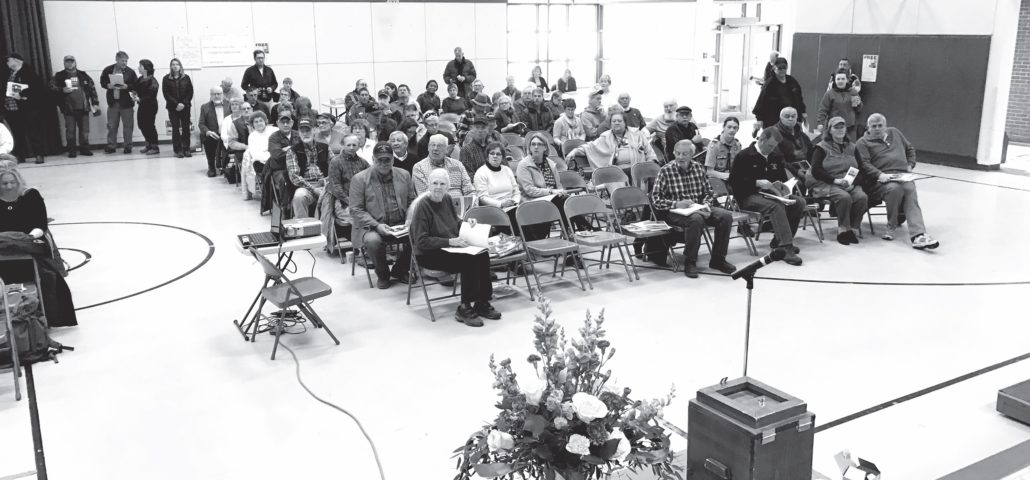China TIF committee receives half dozen requests for funds
 by Mary Grow
by Mary Grow
Members of China’s Tax Increment Financing (TIF) Committee reviewed half a dozen requests for TIF funds at their June 14 meeting and forwarded all to the Board of Selectmen with recommendations that the funds be disbursed.
China selectmen are scheduled to meet at 6:30 p.m. Monday, June 21.
The longest discussion was over appropriations for trail work in town. The total allocated for the fiscal year that begins July 1 is $65,000. The Four Seasons Club asked for $30,000; the Thurston Park Committee asked for $57,582.
Jeanette Smith, speaking for the Thurston Park Committee, listed three priorities that would use most of the money. The committee would like to do ditching and install culverts on two existing trails; to build a storage building for equipment and supplies; and to add a carry-in boat launch area with a small parking lot.
The need for an equipment building is urgent, Smith said; but the $22,000 cost estimate is almost a year old, and neither she nor committee members consider it realistic any more.
Trail work is also urgent, to prevent damage to trails in which Thurston Park committee members and volunteers have already invested money and time. The estimated cost is $17,600.
Committee members decided to recommend a $30,000 allotment to the Four Seasons Club and $35,000 to the Thurston Park Committee. They expect the committee to have the trails improved as needed; to spend the rest of the appropriation on less expensive items listed in the application for TIF funds; and to postpone the building for a year.
The other recommended expenditures are as follows.
— For the China Region Lakes Alliance, $37,500 and for the China Lake Association, $12,500, for a total of $50,000. Both organizations will use the funds for projects that contribute to better water quality in town lakes, including the LakeSmart Program and improvements to control run-off from gravel roads.
— For the China Broadband Committee, $10,000, to fund a contract with consultants Mission Broadband that will run through Nov. 12, 2021. Committee Chairman Robert O’Connor said if the CBC receives a $7,500 state grant to plan expanded broadband service, committee members will ask for another $2,500 in July as a match for the grant.
— For the Alewife Restoration Initiative (ARI), aimed at opening passage for alewives from the Sebasticook River into China Lake, $30,000 (in addition to $20,000 voters approved June 8 as part of the 2021-22 town budget). Landis Hudson, of Maine Rivers, leader of the seven-year project, said this summer will see it finished, with the construction of a fishway at Outlet Dam in East Vassalboro.
There was no opposition to any of the recommendations. On several votes, a committee member abstained to avoid any appearance of conflict of interest.
In other business June 14, Town Manager (and China and TIF Treasurer) Becky Hapgood and committee Chairman Tom Michaud summarized additional work to complete the causeway project at the head of China Lake’s east basin.
Hapgood explained work will include $35,460 for more paving, to benefit ongoing maintenance, and $12,400 to complete the wall between the boat ramp and the existing wall, to enhance safety. The public works budget will cover these expenditures. The remaining funds needed for the project ($112,882.91) will come from TIF money, she said.
Some of the committee actions were possible because China voters on June 8 approved the Second Amendment to China’s TIF document. For example, the revised document adds expanded broadband service as a new category eligible for TIF funds. Committee member Jamie Pitney said the Second Amendment needs approval by the relevant office in the Maine Department of Economic and Community Development.
The next TIF Committee meeting is scheduled for Monday evening, July 12. One agenda item will be election of new officers.
Michaud is stepping down as chairman and James Wilkens as vice-chairman, though both will remain on the committee if selectmen reappoint them; and Michaud’s wife Marie is un-volunteering as committee secretary.








 by The Town Line staff
by The Town Line staff